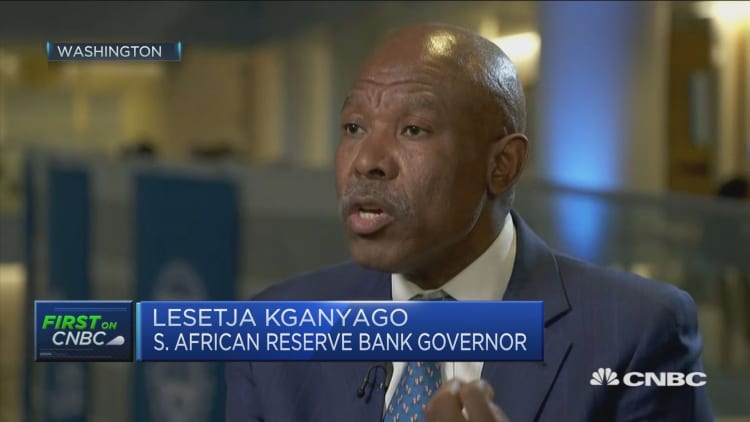A possible downgrade of South Africa's credit rating on November 1 may already be priced into markets, but structural reforms are still needed, the country's central bank governor has told CNBC.
Moody's is the last of the three major ratings agencies to rate South African government debt at investment grade, but is expected by some to cut to sub-investment grade, colloquially known as 'junk' status, at its next review.
South Africa faces a range of economic challenges as domestic and international pressures weigh on Africa's second-largest economy, and the World Bank recently cut the country's growth forecast sharply.
Speaking to CNBC's Geoff Cutmore at the IMF Annual Meeting in Washington D.C. on Thursday, South African Reserve Bank Governor Lesetja Kganyago said Pretoria was "alive" to the issues raised by ratings agencies.
"From where we're sitting as a central bank, what we look at is we ask ourselves the question 'is a downgrade reflected in the current financial market prices?'" Kganyago said.
"If it is reflected in the current financial market prices, then a downgrade should not have such an adverse effect on the South African financial assets because it is already priced in, but if it is not priced in, we are going to see an outflow of funds from the South African bond markets."

Kganyago suggested that if the downgrade goes ahead and South Africa falls out of investment-grade-only indices, the country's debt will still attract investors but market stability may become a problem.
"The problem with those sub-investment grade investors is that they are speculative in nature and they will just introduce volatility of capital flows for South Africa," he added.
Regarding South Africa's debt burden, Kganyago argued that the current government had been "very prudent" with borrowing in foreign currencies, while South African corporates had not "binged" on foreign-denominated debt, meaning neither sector was exposed to sudden currency swings.
Structural reforms
Kganyago said the central bank is approaching the challenges faced by South Africa's economy as fundamental structural problems which are holding back growth.
A recent growth plan put forward by Finance Minister Tito Mboweni aimed to set out the necessary reforms of state-owned entities such as energy near-monopoly Eskom Holdings, which have been at the core of the country's economic frailties.
Eskom is a debt ridden power utility company which analysts view as crucial to the health of South Africa's economy. It has begun a series of rolling blackouts across the country amid maintenance problems.

Kganyago defended the central bank's monetary policy moves but said the structural reform necessary to stabilize the economy would "take time" and would only be felt "beyond the horizon that political leadership looks at."
"It might be five, seven, maybe 10 years down the line before you really see the hard benefits from structural reform," he said, adding that the central bank and President Cyril Ramaphosa's government was addressing the "low hanging fruit" for immediate reform while looking ahead to medium term policy goals.
Former President Jacob Zuma is set to stand trial next year over corruption allegations which marred his nine-year reign, and Kganyago attributed the delay in implementing reforms to independent institutions having been "gutted" by the previous administration.
"The independent electoral commission remained independent but the government's own fiscal effort in the South African Revenue Services was significantly weakened as a result," he said.
"These things took nine years to destroy, it is not something that you could just put in place within a period of 12 months and then you will get success. What is important is the direction that we are following."

